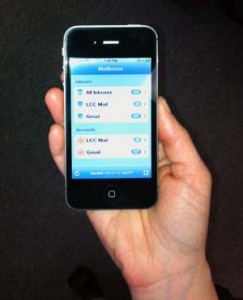 I spoke to students recently about a phenomenon I call “Preoccupied Montreal.” Exactly what is ”Preoccupied Montreal”? It is my way to describe our collective obsession with cell phones, smart phones, BlackBerries—or “CrackBerries” as the slang goes. Cell phone/smart phone use can actually be addictive and I have some concerns; in my view too many teenagers and adults are suffering and need to change their habits.
I spoke to students recently about a phenomenon I call “Preoccupied Montreal.” Exactly what is ”Preoccupied Montreal”? It is my way to describe our collective obsession with cell phones, smart phones, BlackBerries—or “CrackBerries” as the slang goes. Cell phone/smart phone use can actually be addictive and I have some concerns; in my view too many teenagers and adults are suffering and need to change their habits.
This generation of teenagers has a timeless desire to do what every teenager has ever wanted: to be closely connected to friends. It’s cool and feels good to be “in the know.” So carrying a cell phone makes sense; they quite simply help to make our lives a little easier. However, the temptation to carry the phone wherever you go and check it incessantly rules way too many lives in ways that have become unhealthy.
With the capacity to contact anyone, anywhere anytime comes the odd compulsion among many teens to text, tweet or post statements, opinions, observations, photos or videos on social media, just because they can. The feedback is instant, so clearly someone is listening: someone cares.
Recent studies show that teenagers across North America send on average 100 texts/day, more than double just a few years ago. Most teens surveyed say that the cell phone is now the key to their social lives. In fact, data shows that on average, when out of school, teens spend just as much time texting as they do talking with friends. In fact, texting has become so second nature, about 60% of teens surveyed claim to be able to text blindfolded.
However, the 24/7 compulsion to connect without boundaries is unhealthy and can steal balance from young lives. Some of these digital addicts are even losing sleep, even though sleep is one of the most important elements of their lives they can control. Notably, sleep has a direct correlation with better performance in school. Eight or more hours of sleep per night can translate into a 10% improvement in achievement simply because sleep stabilizes and protects memory and other brain functions.
There are now a lot of studies that show that a lack of “down time” is detrimental to us—teens and adults alike. We all need to be out of reach sometimes and avoid being interrupted. This shield of protection should also extend to family meals, quiet discussions with friends, outdoor activities.
I don’t suggest we throw away the technology. We need it. I think it can really help out lives. But who’s “driving the bus“ here, you or the cell phone? We’ve allowed it to seep into every corner of our lives. It’s time to create some no-go cell use zones and times in our lives beyond school. Limit its use and call back later. By then you’ll have something more interesting to say anyway.
Seize the now. Be in the moment. This applies to adults as well. We adults are often the worst offenders. Blurring borders between work and family/personal time generally means more stress and more unwanted cranky moments. So take steps to define better boundaries. Make this the topic of discussion at tonight’s family dinner table. But first, turn off the “CrackBerry” more often in 2012 and enjoy not being interrupted! —Chris Shannon, Headmaster
